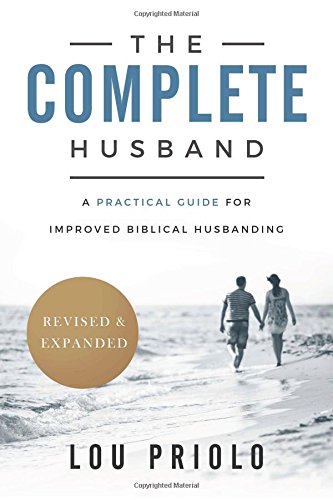
Quotes by Lou Priolo
Comparing the harm of living with parents who are seriously at odds to the harm of breaking their family apart is, generally speaking, like comparing catching a cold to getting double pneumonia. The effects of one are far less severe than the effects of the other… As bad as this current situation is for your children, it would almost certainly be worse for them to have to endure the demise of their family – not to mention the terrible impact that your example of selfishness, hypocrisy, and rebellion would be likely to have on them
It’s nothing but sheer wickedness for you not to forgive your offender for what he’s done, in light of all that you’ve been forgiven (by Christ). When you compare the trivial offenses which you must forgive, with the enormous, eternal offenses you’ve committed against a holy God, the point is uncontestable.
Living day in and day out with guilt over sin that has not been properly confessed and forsaken expends a certain amount of emotional energy; it saps your emotional strength and causes you to become emotionally exhausted (i.e., depressed).
Endurance is the ability to weather a trial without resorting to sinful means of deliverance.
Ultimately, God is the One who will right all wrongs. Vengeance is lawlessness because it does not recognize the lawful and righteousness execution of God’s judgment which He will bring about in His time. In other words, vengeance amounts to being impatient with God. You must remember that wrongs cannot always be righted immediately.
You must completely end the adulterous affair. This other person must be plainly told that the relationship is over. If possible, ask for forgiveness (preferably on a conference call with your spouse or pastor on the line) for your selfishness and deceit. There can be no continuing communication (no secret rendezvous, telephone calls, cards, letters, or e-mails). The other person should be emphatically told not to contact you anymore. You must be willing to amputate from your life anything that will tempt you to reopen this [relationship]… Don’t keep any mementos, photographs, keepsakes, or other memorabilia that might tempt you to spend time thinking about (and fueling romantic feelings for) the other person. You may have to change your telephone number, your e-mail address, or the route you take to and from the office… [Now you will have to take the] money, time, thoughts, dreams, affection, initiative, and creative energies [that you spent on] the other person…[and reinvest them] with your spouse.
Masturbation, although not identified by name in the Bible, must be viewed as sinful for at least three reasons. First, masturbation is a perversion of the intent of sex. It’s selfish rather than loving – it’s taking rather than giving. God did not give you your sexual organs so that you could please yourself with them, but rather so that you could bring pleasure to your wife, and so that she can express her love to you by giving you sexual pleasure. Second, masturbation almost always involves sinful lust. Jesus made it absolutely clear that everyone who looks on a woman to lust for her has committed adultery with her already in his heart (Matt. 5:28). Third, masturbation is an activity that causes Christians who practice it to experience guilt. The Bible is also very clear about the sinfulness of Christians who willingly participate in any activity for which their consciences condemn them (Rom. 14:22-23).
Many men, even Christian men, view sexual relations with their wives as little more than an opportunity to masturbate. They are concerned only with pleasing themselves. They do not realize that God gave them their sexual organs, not primarily for their own pleasure, but rather for the pleasure of their wives (1 Cor. 7:4). They have never learned that in sexual relations, as in all other areas of life, it is more blessed to give than to receive (Acts 20:35).
Peaceful feelings can be deceptive. Besides, having peace is never mentioned in the Bible as a way of determining God’s will. For that, we must consult God’s Word – which is clear about this matter.
I can tell you without any fear of contradiction or oversimplification that the root cause of all marriage conflicts is selfishness. I can say that because there’s probably no better practical synonym for the concept of sin than selfishness. Sin (i.e., selfishness) is at the heart of all marriage problems.
People “fall in love” because they want to. When you “fell in love” with your wife, you were not struck with some external force such as Cupid’s arrow. Neither were you dazzled by some external influence such as Love Potion #9. The romantic feelings you enjoyed, which you claim to have now lost, were of your own making. They were created in your own heart. They, like your other feelings, were largely the result of your thoughts and ways. You “fell in love” with your spouse as a result of what you did to, for, and with her and as a result of what you told yourself about her. You created those romantic feelings, and by God’s grace, you can make them come back.
Unbiblical reasons to pursue a divorce:
1. “My feelings have changed. I’ve fallen out of love with her” (Pr. 28:26; Mt. 24:12; 1 Cor. 13:5-6; Rev. 2:1-7).
2. “That man has killed all the love I ever had for him” (Lev. 19:18; Mt. 5:43-48; 22:34-40; Gal. 5:14; Eph. 5:25; Tit. 2:3-5).
3. “It is not good for the children to have to live in a home with so much conflict, hatred, and disharmony” (Jer. 16:12; Lk. 12:1; Rom. 12:18; 14:19; 1 Cor. 7:12-16; Eph. 4:3; 6:4; 1 Thes. 5:13; 1 Tim. 4:12; Heb. 12:25).
4. “I’m tired of trying” (1 Sam. 1:24ff; Heb. 10:36; 12:1-11; Jas. 1:2-8).
5. “I have peace about it” (Jonah 1:5-6; Rom. 14:22-23; Col. 3:15).
6. He has lied to me repeatedly. I will never be able to trust him again” (Pr. 3:5-6; 20:6; Lk. 17:3; Ac. 15:36-39; Col. 4:10; 2 Tim. 4:11’ 1 Pet. 3:5-6).
7. I cannot continue to live in this constant state of confusion that this marriage keeps me in” (2 Cor. 4:8; 1 Cor. 10:13; Phil. 4:13).
8. I’ve lived with her for umpteen years and I know that she will never change” (Psm. 138:8; 1 Cor. 1:8; Eph. 3:20; Phil. 1:6; 2:13; 2 Tim. 1:12; Ju. 24).
9. My family and friends are all advising me to get out of this horrible marriage” (Pr. 11:14; 15:22, 24; 24:6; Rom. 14:22-23; 1 Cor. 15:33).
Excerpted from: Divorce: Before You Say “I Don’t,” 2007, P&R, p. 18-23. Used by Permission.
Consequences of pursuing an unbiblical divorce:
1. You will be confirming to all your brothers and sisters in Christ that you have a hard heart.
2. You will bring shame to the name of Christ.
3. You will be subject to God’s discipline.
4. You will multiply your misery by the guilt and bitterness you will inevitably experience.
5. You will cause much hurt and potential harm to others.
Excerpted from: Divorce: Before You Say “I Don’t,” 2007, P&R, p. 6-9. Used by Permission
In all my 13 years as a professional marriage counselor, I’ve never seen an unbiblical divorce cause less pain and suffering than it would have taken to “fix” the marriage… When a Christian initiates an unbiblical divorce, it’s always because he’s hardened his heart against God… It’s his self-centeredness and discontentment that causes a man to forsake his wife and family, separate himself from them, seek his own desire, and look for greener pastures elsewhere.
The ultimate weapon to use against those who do evil is to love them; to meet their needs.
One’s ability to find hope in a seemingly hopeless situation is directly related to the ability to see God’s hand in that situation. If you are despairing…you are probably not focusing on what God intends to do in your life, and for His kingdom as a result of it.
What is forgiveness? Forgiveness is not a feeling. Forgiveness, first and fundamentally, is a promise. When you grant forgiveness to someone, you’re making a promise to that person which involves the following three things: 1. You’re promising not to bring up the offense again to the forgiven person in the future. 2. You’re promising not to speak to others about the offense. 3. You’re promising not to dwell on the offense yourself.
The Scripture likens bitterness to a root (Heb. 12:15). Roots have to be planted. So, what’s the seed that sprouts into a root of bitterness when planted? It’s a hurt. When someone hurts you it’s as if a seed has been dropped onto the soil of your heart. You can choose to respond in two ways: You can either reach down and pluck up the seed by forgiving your offender, or you can begin to cultivate the seed by reviewing the hurt over and over again in your mind. Bitterness is the result of dwelling too long on a hurt; it’s the result of not truly forgiving the offender (Mt. 18:34-35).
Bitterness (or resentment) is the result of an unwillingness to properly forgive those who have sinned against you.
If your anger is due to your recognition that a holy God has been offended by another’s behavior, that anger is righteous. In other words, if we are angry because God’s revealed will (not His decreed will; for everything that happens has been foreordained by Him) is violated, our anger is righteous. On the other hand, if your anger is the result of not having your personal desires met, that anger is likely to be sinful.
The best evidence that a Christian desires (loves) something more than he desires (loves) God is his willingness to sin against God either in order to acquire that desire. “If you love Me keep My commandments,” Jesus said (Jn. 14:15).


